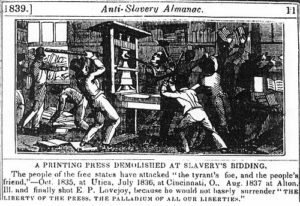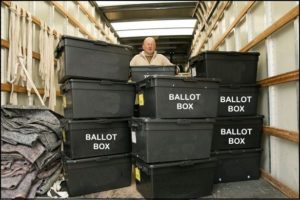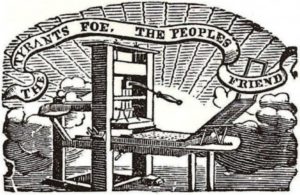Journalism is the activity or job of collecting, writing, and editing news articles for the news media (web sites, newspapers, magazines, television, radio, etc).
Journalism provides independent information about public affairs as a public service. It is essential to democracy.
Journalists use objective methods and hold themselves to ethical standards. (They are not themselves entirely objective. No one is.) They are transparent (for instance, they tell you who their sources are), they have humility (in that they don’t set themselves up as experts), and they go to expert sources for public information. They work on original research and write original articles. They are accountable for mistakes; they will admit them and make corrections to the record.
Journalists follow a strong code of ethics which could be summarized as: Seek the truth; Act independently; Minimize harm; Be accountable. (See the Society of Professional Journalists web site).
According to Bill Kovach and Tom Rosenstiel in The Elements of Journalism ({Parts of which are at theAmerican Press Institute):
Seeking out multiple witnesses, disclosing as much as possible about sources, or asking various sides for comment, all signal such standards. This discipline of verification is what separates journalism from other forms of communication such as propaganda, advertising, fiction, or entertainment.
Journalism can be news and it can be opinion. But these are two different things and should be clearly labeled.
Journalism is News, written by professional journalists, consisting of facts that originate from responsible sources and are checked for accuracy. News should be unbiased by cultural or political opinions.
Journalism is Opinion, written by professional journalists, or by experts in various fields, or by members of the public (in letters to the editor). These opinions are intended to enrich public understanding, and they should always be labeled as opinion or editorial content, for example, presented on an editorial page or using an editorial banner on TV.
S0 — Even though “Fox and Friends” and similar “talk shows” are highly opinionated, it is still journalism in the sense that these opinions are offered as a public service.
However, outright fakery is never considered journalism. For instance, the show “Infowars” with Alex Jones is not transparent about sources, is not accountable, and unashamedly presents outright lies and deception. It may be entertainment, but it is not journalism.
A Pew Research Center study recently showed that only about one quarter to one third of Americans are good at distinguishing between fact and opinion
Journalism does not mix with advertising. It is unethical to plug a product while delivering the news. For instance:
- “There is a stampede, not only out of Afghanistan, but a stampede away from high prices, overpriced service from the big carriers like Verizon, AT&T, T-Mobile. The average family making the switch to PureTalk.” — Sean Hannity on his radio show, Aug. 16, 2021
- “How would you like to be in Kabul today, as an American, and you can’t get to the airport? Where are you thinking your life is headed? If you’re one of those family members, I bet you’re not sleeping. … MyPillow.com. That’s where I go. I fall asleep faster, I stay asleep longer.” — Sean Hannity on his radio show, Aug. 17, 2021.
(Both examples from an opinion piece in the Washington Post, Aug. 19, 2021).
Are journalists ‘enemies of the people?’

Elijah Lovejoy was killed by a mob in 1837 while defending his printing press in Illinois. Lovejoy was an abolitionist who fought slavery before the Civil War.
Former US President Donald Trump constantly repeated the notion that journalists are “enemies of the people.” This rhetorical tactic is known as “flipping the script,” since, historically, the press was well known as the enemy of tyrants. To try to turn the idea on its head is an obvious attempt to deceive credulous people.
The truth is that historically, and still very much today, freedom of speech and of the press is held in reverence by people who love democracy, and that includes Trump supporters and other conservatives.
A Wikiquote page has hundreds of examples.
Historically, and still very much today, journalists have depicted the best of human kind and exposed the worst; they fought for freedom, and against slavery; they fought for justice, and against tyranny; they championed relief for the poor and oppressed; and they led campaigns against public corruption. Great heroes of the press, such as Benjamin Franklin, Elijah Lovejoy, Joseph Pulitzer, Joe Rosenthal, Ida B. Wells, and many others, made it their mission to lift the vision of the nation and uphold the public interest.
The Virginia Constitution, Section 12, says: That the freedom of the press is one of the great bulwarks of liberty, and can never be restrained but by despotic governments.
Journalists are far from perfect. But until Donald Trump came along, the only places journalists were called “enemies of the people” were Russia, China, Nazi Germany and Saudi Arabia.
Journalists should always be aware of fake news, propaganda and deceptive practices. They should label or exclude fakery from the public record.
Spotting propaganda and fake news

Faking Fraud: A Sept. 20, 2016, “Christian Times Newspaper” shows “Randall Prince” with his supposed discovery of fraudulently pre-marked Clinton ballots in the Ohio primary. In fact, the picture was taken in 2015 in Birmingham, England, and was just about preparation for an upcoming election. The fake was caught on Snopes.com, a good place to check the veracity of online news.
Spotting fake news has become something of an arm-chair sport in the 2020s.
Another web site at the University of Pittsburgh helps provide standards to debunk fake news.
So, clearly, what is NOT journalism is the suite of “Disinformedia” sites, run out of Los Angeles, or the “ChristianTimesNewspaper” run out of a Baltimore suburb, with stories for example about voter fraud and Hillary Clinton in the months before the 2016 election.
But these American cyber news fakes were pretty small potatoes compared to the sophisticated manipulation behind Russia’s cyber campaign to disrupt the U.S. election, according to a variety of articles listed below. Thousands of full time expert hackers in Russia, China, North Korea and other countries are engaged in a constant attack on Americans, leading them (for example) to pick the weakest possible presidential candidates and to devalue democratic institutions.

From a Russian troll farm, summer 2018, according to CNN. Perfectly legit, according to RT. https://www.youtube.com/watch?v=oeO0B6MpraU (Oh really?)
The news about fake news:
The “Troll Farm” in St. Petersburg, Russia pushed American activists into fighting each other before the election.
Fake news and botnets: How Russia weaponized the web, Guardian, December 2, 2018
Securing Democracy — A dashboard that displays data about Russian propaganda efforts on Twitter in near-real time. Our analysts use the dashboard and other sources to discover Russian propaganda themes.
Russian Television (RT.com) says that the Walk Away campaign was not created by Russians.
A chilling view of leakers
Does journalism need to change?
In the wake of the COVID 19 pandemic and the 2020 Black Lives Matter protests, some people are asking whether journalism needs to change the basic premises of news coverage.
Candis Callison and Mary Lynn Young, who wrote Reckoning: Journalism’s Limits and Possibilities say that journalists are trained to ask who, what, where, why, when and how. But a question that doesn’t often make it into the news is this: how do we want to live together?
Margaret Sullivan, in a June 7, 2020 Washington Post op-ed, insists that journalism is not “just the facts” stenography:
Every piece of reporting — written or spoken, told in text or in images — is the product of choices. Every article approaches its subject from somebody’s perspective. Every digital home page, every printed front page, every 30-minute newscast, every one of the news alerts blowing up your phone, every radio talk show is the product of decision-making. We choose what to focus on, what to amplify, what to investigate and examine.
That’s why the simplistic “just the unadorned facts” can be such a canard. And that’s why the notion to “represent all points of view equally” is absurd and sometimes wrongheaded. “Journalism is not stenography” is a refrain from an astute editor I know.
The real answer is to make better, wiser choices — ones that best serve our important mission to find and tell the truth.
Margaret Sullivan

